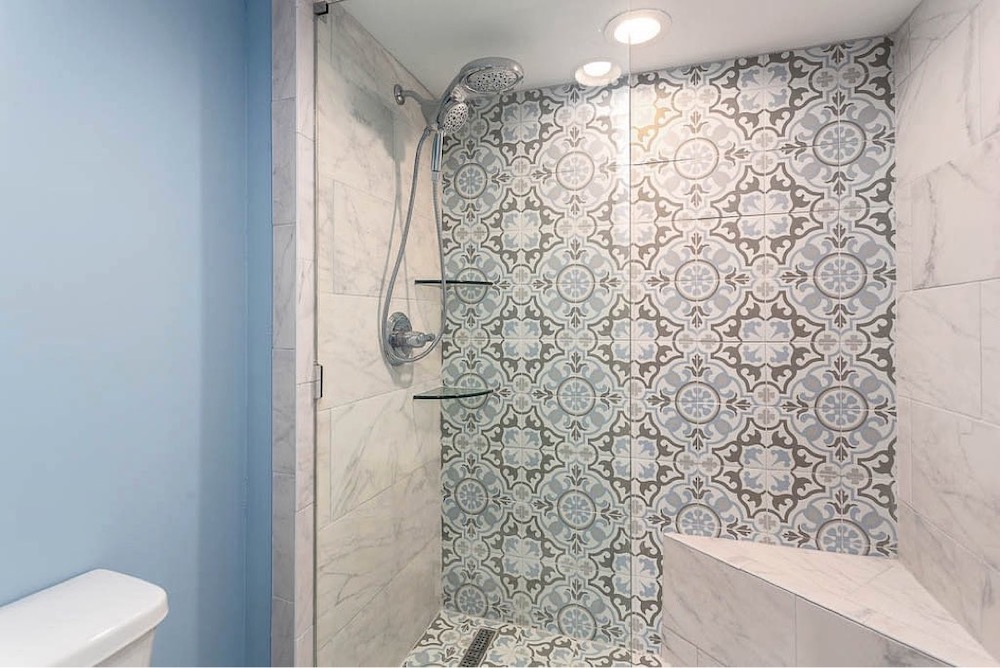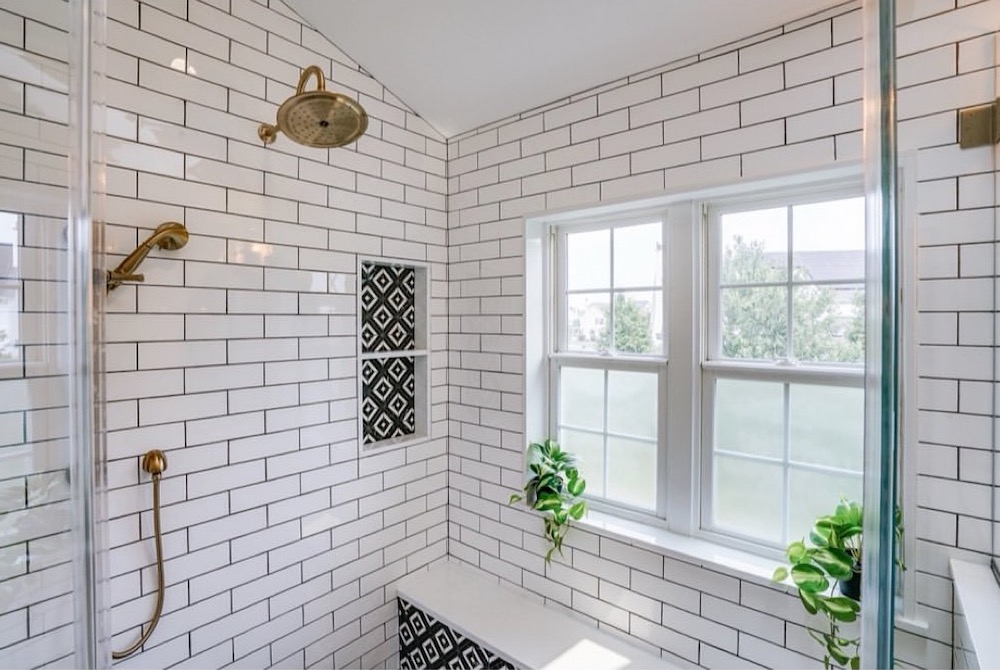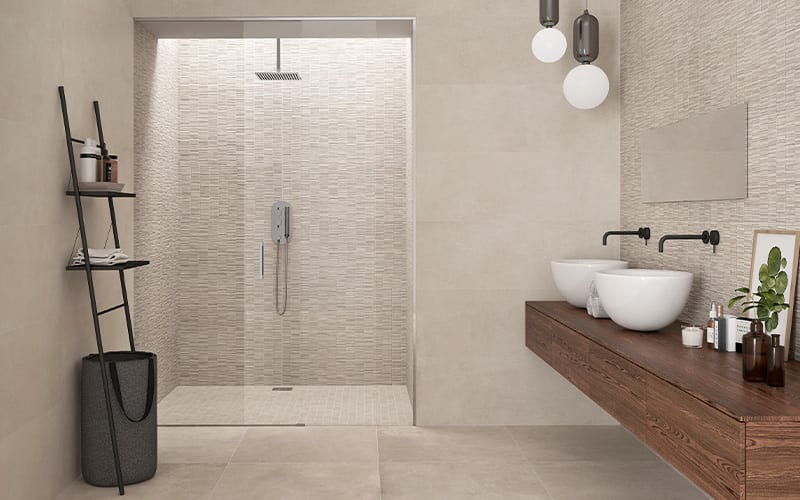Introduction: The Importance of Tile Selection in Shower Design
When it comes to designing a shower, selecting the right tiles is crucial for achieving both aesthetic appeal and functionality. Among the myriad options available, ceramic and porcelain tiles stand out as popular choices due to their durability, versatility, and wide range of designs. In this comprehensive guide, we’ll explore the differences between ceramic and porcelain tiles, helping you make an informed decision for your shower project.

Understanding Ceramic Tiles: Characteristics and Benefits
Ceramic tiles are made from clay that is fired at high temperatures, resulting in a hard, dense material that is ideal for use in showers. Some key characteristics and benefits of ceramic tiles include:
- Versatility: Ceramic tiles come in a variety of colors, patterns, and textures, allowing for endless design possibilities in shower applications.
- Affordability: Ceramic tiles are typically more budget-friendly than porcelain tiles, making them an attractive option for cost-conscious homeowners.
- Ease of Installation: Ceramic tiles are relatively lightweight and easy to install, making them suitable for DIY projects or professional installations.

Exploring Porcelain Tiles: Durability and Performance
Porcelain tiles are crafted from refined clay and fired at extremely high temperatures, resulting in a dense, durable material that is highly resistant to water, stains, and scratches. Some key characteristics and benefits of porcelain tiles include:
- Durability: Porcelain tiles are renowned for their strength and durability, making them an ideal choice for high-traffic areas such as showers.
- Water Resistance: Porcelain tiles have low water absorption rates, making them resistant to moisture and ideal for wet environments like showers.
- Low Maintenance: Porcelain tiles are easy to clean and maintain, requiring minimal effort to keep them looking like new.

Water Absorption: Understanding the Difference
One of the primary differences between ceramic and porcelain tiles lies in their water absorption rates. Porcelain tiles have a lower water absorption rate (typically less than 0.5%), making them highly resistant to water penetration. This property makes porcelain tiles an excellent choice for showers, where moisture exposure is a concern. In contrast, ceramic tiles have a slightly higher water absorption rate (usually between 0.5% and 3%), making them suitable for shower walls but less ideal for shower floors, where constant exposure to water is expected.
Slip Resistance: Safety Considerations for Shower Floors
Another important factor to consider when selecting tiles for your shower is slip resistance, particularly for shower floors where safety is paramount. Both ceramic and porcelain tiles can be manufactured with textured surfaces or treated with non-slip coatings to improve traction and reduce the risk of slips and falls. When choosing tiles for your shower floor, opt for options with higher slip resistance ratings, such as those certified by the Ceramic Tile Institute of America (CTIOA) or the Porcelain Enamel Institute (PEI), to ensure a safer bathing experience.

Design Considerations: Matching Style with Functionality
In addition to performance considerations, it’s essential to consider the aesthetic aspects of ceramic and porcelain tiles when designing your shower. Ceramic tiles offer a wide range of colors, patterns, and finishes, allowing for creative expression and customization in shower design. Porcelain tiles, on the other hand, often mimic the look of natural stone or wood, offering a timeless and sophisticated aesthetic that can complement a variety of design styles. Whether you prefer the versatility of ceramic tiles or the elegance of porcelain tiles, there are options available to suit every taste and preference.
Installation and Maintenance: Practical Considerations
When it comes to installation and maintenance, both ceramic and porcelain tiles offer distinct advantages. Ceramic tiles are relatively easy to install and can be cut to size using standard tile-cutting tools. However, they may require more frequent sealing to protect against moisture penetration and staining. Porcelain tiles, on the other hand, are denser and harder to cut, requiring specialized equipment for installation. While porcelain tiles are inherently more resistant to water and stains, they still require regular cleaning and maintenance to preserve their appearance and performance over time.
Grout Considerations: Enhancing Performance and Aesthetics
When installing ceramic or porcelain tiles in your shower, grout selection is just as important as tile selection. Grout not only holds the tiles in place but also seals the gaps between them, preventing water penetration and mold growth. For showers, it’s essential to choose a grout that is resistant to moisture, stains, and mildew. Epoxy grout is an excellent choice for showers due to its waterproof properties and resistance to stains and mold. Additionally, consider the color of the grout and how it complements the tiles—opting for a contrasting or matching grout color can enhance the aesthetic appeal of your shower design.

Environmental Considerations: Sustainable Tile Options
For environmentally conscious homeowners, considering the eco-friendliness of ceramic and porcelain tiles is essential. Both ceramic and porcelain tiles are inherently sustainable materials, as they are made from natural clay and minerals and are long-lasting and durable. However, for those looking to further reduce their environmental impact, there are options available, such as recycled ceramic or porcelain tiles made from post-consumer or post-industrial materials. Additionally, choosing tiles manufactured locally or with energy-efficient production methods can further minimize the carbon footprint of your shower project.
Professional Installation: Ensuring Quality and Longevity
While DIY installation of ceramic or porcelain tiles is possible for those with the necessary skills and experience, hiring a professional installer can ensure quality results and long-term durability. Professional installers have the expertise, tools, and resources to properly prepare the substrate, install the tiles evenly, and seal the grout effectively, minimizing the risk of issues such as water damage, uneven tiles, or grout discoloration. Investing in professional installation can provide peace of mind and ensure that your shower not only looks beautiful but also functions flawlessly for years to come.
Conclusion: Making the Right Choice for Your Shower
Choosing between ceramic and porcelain tiles for your shower ultimately depends on your specific needs, preferences, and budget. While ceramic tiles offer versatility and affordability, porcelain tiles excel in durability, water resistance, and low maintenance. Consider factors such as water absorption, slip resistance, design preferences, and practical considerations when making your decision. Whether you opt for the timeless appeal of porcelain or the creative possibilities of ceramic, selecting the right tiles will ensure a shower that not only looks stunning but also functions flawlessly for years to come.
